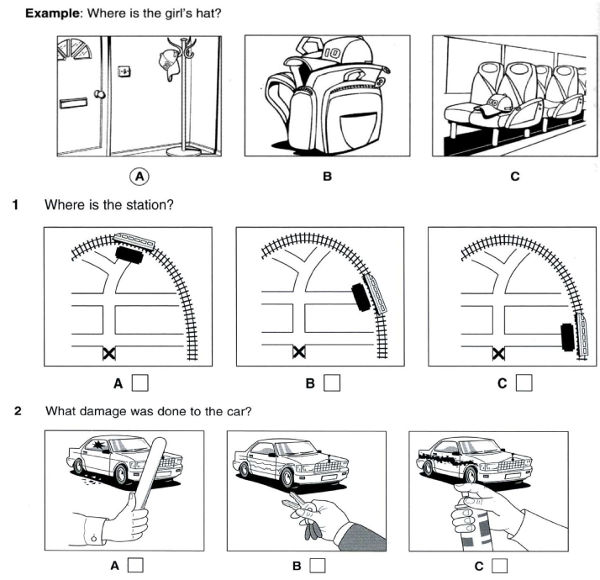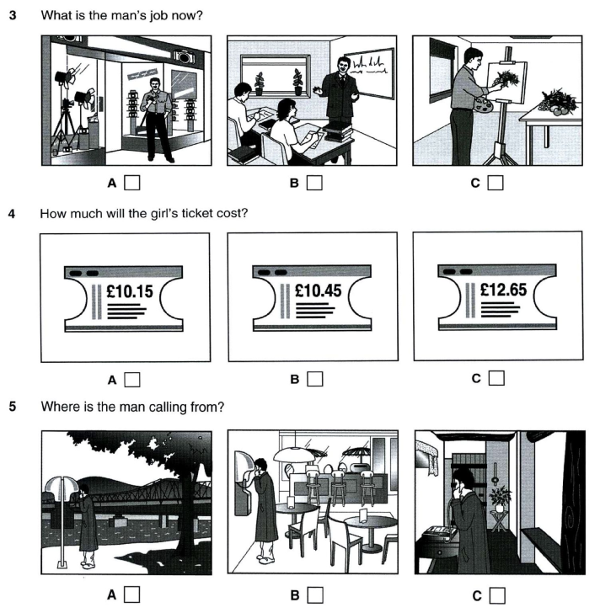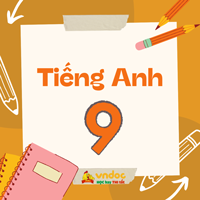Bộ đề thi tuyển sinh vào lớp 10 môn Tiếng Anh CÓ ĐÁP ÁN (1)
Bộ đề thi tuyển sinh vào lớp 10 môn Tiếng Anh CÓ ĐÁP ÁN (1)
Hỗ trợ thêm cho các bạn học sinh có thêm tư liệu ôn thi vượt qua kì thi tuyển sinh vào lớp 10, VnDoc.com xin chia sẻ đến các bạn Bộ đề thi tuyển sinh vào lớp 10 môn Tiếng Anh CÓ ĐÁP ÁN (1). Hi vọng, thông qua việc giải trên từng đề thi cụ thể này sẽ giúp các bạn ôn tập kiến thức trọng tâm, làm quen với cấu trúc đề thi từ đó rút kinh nghiệm cho kết quả bài thi tốt nhất.
Đề thi tuyển sinh vào lớp 10 môn Tiếng Anh năm học 2016 - 2017 Sở GD-ĐT Đồng Nai
Đề thi tuyển sinh vào lớp 10 môn Tiếng Anh năm học 2016-2017 tỉnh Thanh Hóa
Đề thi tuyển sinh vào lớp 10 THPT Chuyên môn Tiếng Anh (Đề Chuyên)
I. LISTENING: (2 points)
PART 1: There are 5 questions in this part. For each question there are three pictures and a short recording. Listen to each recording twice. Choose the correct picture (A, B or C) and write it in the numbered box on your answer sheet. (1 point)


PART 2: You will hear a conversation between a man, Marco, and his wife, Sarah, about a film they have just seen at the cinema. Decide if each sentence is correct or incorrect. If it is correct, write the letter (A) for YES, if it is not correct, write the letter (B) for NO in the numbered box on your answer sheet. (1 point)
| A | B | |
| YES | NO | |
|
1. Sarah was expecting to enjoy the film. 2. Marco and Sarah agree that the city in the film was London. 3. Marco feels that the length of the film made it rather boring. 4. Sarah was upset about how some of the audience behaved during the film. 5. Sarah was disappointed with the way the main actor performed. |
II. READING: (2 points)
PART 1: Read the following passage, then choose the answer (A, B, C or D) which you think fits best according to the text. Write your answer in the numbered box on your answer sheet. (1 point)
Whole families of musicians are not exactly rare. However, it is unusual to come across one that includes not only writers and performers of music, but also an instrument maker.
When South Wales schoolteachers John and Hetty Watkins needed to get their ten-year-old son, Paul, a cello to suit his blossoming talents, they baulked at the costs involved. "We had a look at various dealers and it was obvious it was going to be very expensive," John says. "So I wondered if I could actually make one. I discovered that the Welsh School of Instrument Making was not far from where I lived, and I went along for evening classes once a week for about three years."
"After probably three or four goes with violins and violas, he had a crack at his first cello," Paul, now 28, adds. "It turned out really well. He made me another one a bit later, when he'd got the hang of it. And that's the one I used right up until a few months ago." John has since retired as a teacher to work as a full-time craftsman, and makes up to a dozen violins a year – selling one to the esteemed American player Jaime Laredo was "the icing on the cake".
Both Paul and his younger brother, Huw, were encouraged to play music from an early age. The piano came first: "As soon as I was big enough to climb up and bang the keys, that's what I did," Paul remembers. But it wasn't long before the cello beckoned. "My folks were really quite keen for me to take up the violin, because Dad, who played the viola, used to play chamber music with his mates and they needed another violin to make up a string trio. I learned it for about six weeks but didn't take to it. But I really took to the character who played the cello in Dad's group. I thought he was a very cool guy when I was six or seven. So he said he'd give me some lessons, and that really started it all off. Later, they suggested that my brother play the violin too, but he would have none of it."
"My parents were both supportive and relaxed," Huw says. "I don't think I would have responded very well to being pushed. And, rather than feeling threatened by Paul's success, I found that I had something to aspire to." Now 22, he is beginning to make his own mark as a pianist and composer.
Meanwhile, John Watkins' cello has done his elder son proud. With it, Paul won the string final of the BBC Young Musician of the Year competition. Then, at the remarkably youthful age of 20, he was appointed principal cellist of the BBC Symphony Orchestra, a position he held, still playing his father's instrument, until last year. Now, however, he has acquired a Francesco Rugeri cello, on loan from the Royal Academy of Music. "Dad's not said anything about me moving on, though recently he had the chance to run a bow across the strings of each in turn and had to admit that my new one is quite nice! I think the only thing Dad doesn't have – and may acquire after about 50 – 100 years – is the power to project right to the back of large concert halls. It will get richer with age, like my Rugeri, which is already 304 years old."
Soon he will be seen on television playing the Rugeri as the soloist in Elgar's Cello Concerto, which forms the heart of the second programme in the new series, Masterworks. "The well-known performance history doesn't affect the way I play the work," he says. "I'm always going to do it my way." But Paul won't be able to watch himself on television – the same night he is playing at the Cheltenham Festival. Nor will Huw, whose String Quartet is receiving its London premiere at the Wigmore Hall the same evening. John and Hetty will have to be diplomatic – and energetic – if they are to keep track of all their sons' musical activities over the coming weeks.
1. Why did John Watkins decide to make a cello?
A. He wanted to encourage his son Paul to take up the instrument.
B. He was keen to do a course at the nearby school.
C. He felt that dealers were giving him false information.
D. He wanted to avoid having to pay for one.
2. What is meant by "crack" in paragraph 3?
A. attempt
B. plan
C. shock
D. period
3. What do we learn in the third paragraph about the instruments John has made?
A. He considers the one used by Jaime Laredo to be the best.
B. He is particularly pleased about what happened to one of them.
C. His violins have turned out to be better than his cellos.
D. It took him longer to learn how to make cellos than violins.
4. Paul first became interested in playing the cello because
A. he admired someone his father played music with.
B. he wanted to play in his father's group.
C. he was not very good at playing the piano.
D. he did not want to do what his parents wanted.
5. What do we learn about Huw's musical development?
A. His parents' attitude has played little part in it.
B. It was slow because he lacked determination.
C. His brother's achievements gave him an aim.
D. He wanted it to be different from his brother's.
PART 2: You are going to read an article about an underwater museum. Five sentences have been removed from the text. Choose from the sentences A-F the one which fits each gap (1-4). There is one extra sentence which you do not need to use. There is an example at the beginning (0). Write your answer in the numbered box on your answer sheet. (1 point)
UNDERWATER WORLD
If you want to dive in clear blue waters, find rich marine life and swim over the remains thrown away by ancient sailors, the tiny island of Ustica is the place to go. This island, 60km from the Italian coast, is the site of Europe's only underwater museum. (0) D.
The clear waters attract some of the world's best underwater divers. The International Academy of Underwater Sciences, which was set up to encourage underwater exploration, is based in Ustica. (1)____.
Dr Honor Frost, a Bristish underwater archaeologist and Golden Triden winner, believes that Ustica shows that some underwater remains are best life in the surroundings where they have been preserved for centuries. (2) ____.
According to Frost, the establishment of the underwater museum has made an interesting area of sea floor, together with the objects which fell to it in antiquity, safe for future study. (3) ____
For example, it is puzzling that only iron anchors of quite a late date seem to have been lost there, despite local evidence of sea trade during a period nearly four thousand years ago, when stone anchors would have been in use. Among the anchors and other remains there are an extraordinary number of Roman millstones, which were widely traded throughout the ancient world. (4) _____.
A. Many questions remain to be answered about the museum site.
B. However, this section of the museum, although already accessible to diving visitors, still contains material of interest to researchers.
C. Made of volcanic rock, they were carried by corn ships heading from Rome to the ports of the north African coast.
D. Only here can divers explore labelled exhibits such as anchors, pots and millstones, which fell to the sea floor centuries ago.
E. This gives divers the experience of underwater archaeology without disturbing important sites.
F. This month it presented its Golden Trident awards, the underwater equivalent of the Nobel prizes, which have been awarded annually since 1960.
Đề thi tuyển sinh vào lớp 10 THPT Chuyên môn Tiếng Anh (Đề chung)
I. Choose the word or phrase (A, B, C or D) that best fits the space in each sentence. Write your answer on the answer sheet. (1.0 point)
1. Robert is going to be famous one day. He _____ in three movies already.
(A) appears (B) has appeared (C) is appearing (D) appeared
2. In the picture, the two lovers were talking _____ balcony.
(A) on (B) in (C) at (D) up
3. Today, many serious childhood diseases _____ by early immunization.
(A) prevent (B) can prevent (C) are preventing (D) can be prevented
4. - Where's Polly?
- She _____.
(A) studies in her room (B) has in her room studies
(C) is studying in her room (D) in her room is studying
5. We will lose this game _____ our team doesn't start playing better soon.
(A) although (B) but (C) if (D) unless
6. _____ problems in sailing in tropical seas is the coral reefs.
(A) One of the biggest (B) The biggest one
(C) Of the biggest one (D) There are the biggest
7. John never comes late, ______ he?
(A) is (B) isn't (C) does (D) doesn't
8. If Bwere rich, he _____ around the world.
(A) should travel (B) travelled (C) must travel (D) could travel
9. Hurricane Andrew swept through southern Florid_____ August 1992.
(A) on (B) in (C) at (D) since
10. Thomas has garden which is _____ mine.
(A) larger (B) the largest (C) as large as (D) more large
II. Reading comprehension
A. Read the text below and choose the correct word or phrase (A, B, C or D) for each space. Write your answer on the answer sheet. (2.5 points)
PLANET EARTH
Planet earth is part of system of planets and their moons, as well as numerous asteroids and comets which (1) _____ around huge star - the Sun. The Sun itself (2) _____ of gas. Nuclear reactions inside its core (3) _____ the heat and light that make life on the Earth (4) _____. The Earth is the third of four small terrestrial (Earth like) planets (5) _____ orbit close to the Sun. Further out in our Solar System are four huge gas planets, while distant Pluto, (6) _____ planet, is made (7) _____ rock and ice. Our Earth is one of the ten planets that orbit the Sun - huge, burning-hot star in the center of our Solar System. The Solar System and all the stars in the (8) _____ are part of our galaxy - the Milky Way, which (9) _____ as many as 200 billions stars. Beyond our galaxy (10) _____ millions more galaxies. They all add together to make up the Universe.
1. (A) run (B) orbit (C) turn (D) walk
2. (A) consists (B) remains (C) includes (D) maintains
3. (A) produce (B) product (C) production (D) productive
4. (A) able (B) possibility (C) possible (D) ability
5. (A) who (B) where (C) what (D) which
6. (A) the smaller (B) smallest (C) the most smallest (D) the smallest
7. (A) from (B) of (C) for (D) in
8. (A) space (B) se (C) moon (D) sky
9. (A) consists (B) makes from (C) stays (D) contains
10. (A) is (B) are (C) to be (D) get
B. Read the text below to decide if each statement is true (T) or false (F). Write your answer on the answer sheet. (1.0 point)
HOW TO SAVE PETROL AND THE ENVIRONMENT
We are all aware of the need to protect the environment but sometimes it's difficult for us to do the right thing. For example, if you're motorist, the convenience of jumping in the car to go somewhere is balanced against the knowledge of how harmful each journey can be. But did you know that making few simple changes to your driving habits will not only do less damage to our world but will also save you money and could even be good for your health?
Do you really need to take the car?
Try making more use of public transport. If the service is frequent and reliable, you'll soon get used to using buses and trains. In fact, for shorter journeys, why not take the opportunity to get into shape and go on foot?
Share the journey
How often do you see cars with just one occupant and the driver is making the same journey as others living nearby? Why not car share and half the cost of the journey? There are several websites where people can swap details and make arrangements to meet up.
Change your habits
When you must use the car, plan your journey so you can go to all the places you need to visit instead of taking the car out again and again. If you get caught in traffic jam, switch off the engine when you're stationary for long time. Try not to brake too sharply or accelerate too quickly as this will lead to you using up more fuel. On cold mornings, don't warm up the engine before you start your journey and when you next put fuel in your car, think about whether you really need to fill up the tank. All that extrweight will put more pressure on the engine.
Servicing
Make sure you carry out basic maintenance like checking the tire pressure regularly. Finally, keep your car regularly serviced so that it runs as efficiently as possible.
Steps like this will save you money and help you do your bit to protect the environment.
Changing the way you drive has more than one benefit.
You should walk when going somewhere nearby.
If you travel with someone else, it will save you money.
You should plan to make lots of short journeys rather than one long journey.
III. Use the correct form of the word given in each sentence. Write your answer on the answer sheet. (1.0 point)
1. In 1978, young pilot and his plane _____ after sighting UFO, and they can never be found again. (APPEAR)
2. When coming to New Zealand, Albert was impressed by the beauty of the country and the _____ of its people. (FRIENDLY)
3. Although there are many _____ throughout the year, Tet is the most important festival for Vietnamese people. (CELEBRATE)
4. The advantage of living in the countryside is that the air is _____. (POLLUTE)
IV. Use the correct tense or form of the verb given. Write your answer on the answer sheet. (2.0 points)
1. We are very worried that poisonous gases (pump) _____ into the atmosphere every day.
2. If we use energy-saving bulbs, we (save) _____ lot of money.
3. While Henry (walk) _____ in the mountain, he saw bear.
4. I wish I (not, be) _____ an only child. It would be great to have brothers and sisters.
5. The librarian asked us (not, make) _____ so much noise.
6. John (have) _____ this bike since his eleventh birthday.
7. Tom spent three months (learn) _____ to play the piano.
8. The flowers (wrap) _____ in yellow paper are 5 dollars.
V. Complete the second sentence so that it has similar meaning to the first one. Write your answer on the answer sheet. (2.5 points)
1. The last time it snowed here was six years ago.
It hasn't ______________



